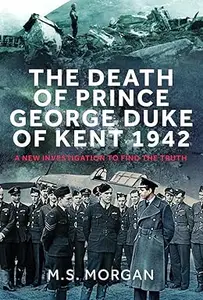The Death of Prince George, Duke of Kent, 1942 A New Investigation to Find the Truth

Free Download The Death of Prince George, Duke of Kent, 1942: A New Investigation to Find the Truth
by M S Morgan
English | 2024 | ISBN: 1036107191 | 256 Pages | True ePUB | 10.2 MB
To the fifteen passengers and crew onboard the lumbering Short Sunderland flying boat, everything appeared normal and routine as it lifted off from the seaplane base at RAF Invergordon on Sunday, 25 August 1942. Its destination was Iceland, where one of the passengers, Air Commodore HRH Prince George, The Duke of Kent, supported by his entourage, was to undertake an inspection of various RAF bases in Iceland in his role as a senior RAF Welfare Officer.
It was about thirty minutes later that disaster struck. At 13.42 hours, the Sunderland ploughed into a hillside on the remote headland known as Eagle’s Rock, near Dunbeath in Caithness. Apart from the rear gunner, everyone on board, including Prince George, was instantly killed.
There was a Court of Inquiry, which opened on 28 August and completed on 1 September. This resulted in a disagreement between two senior officers in relation to its conclusion. The funeral of the Duke surprisingly, took place on the 29th during the Court of Inquiry. There was also a rapid and thorough wreckage clearance of the scene by 16 September and the apparent disjointed recording of the various men’s deaths with the registrar.
Pilot error was the official cause for the crash, allegedly ‘signed off’ by the Chief Inspector of Accidents, but hard evidence has been difficult to find since 1942. In fact, the Court of Inquiry report could not be sourced in the UK and had to be obtained from the Australian archives.
Witness statements and any possible technical assessments have also disappeared and are not even contained in the Australian file. So where are they, and why have the documents for the second worst fatal air crash up to that period of time gone missing? In addition, where is the Duke of Kent’s diary and personal papers for this period? Where any plans drawn of the site and the position of the casualties? Where post mortems carried out and by whom?
